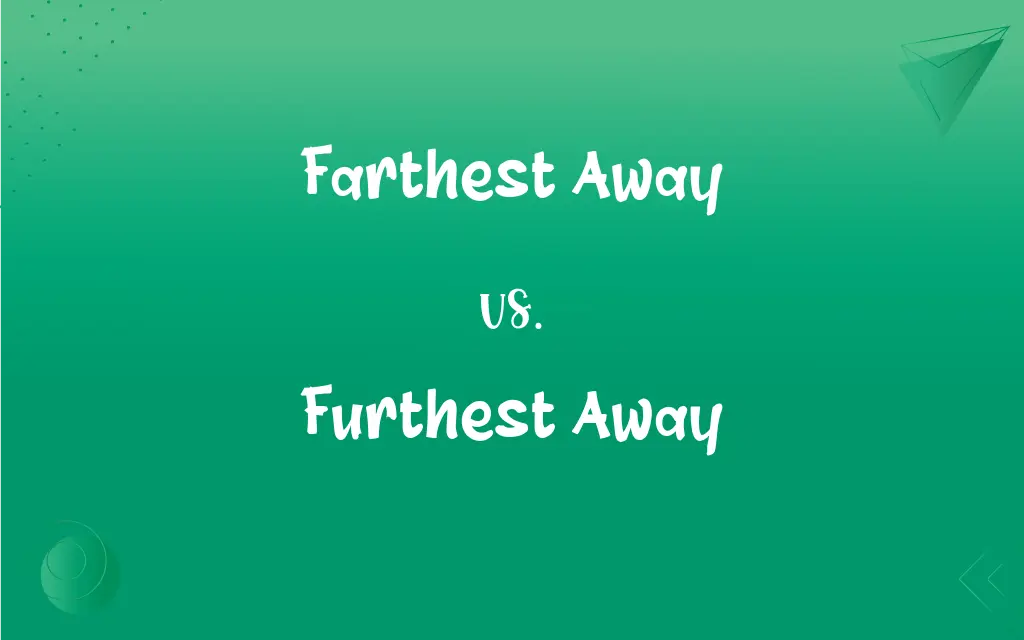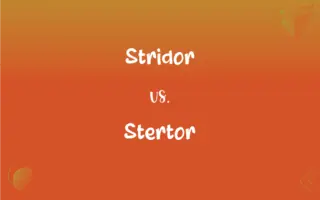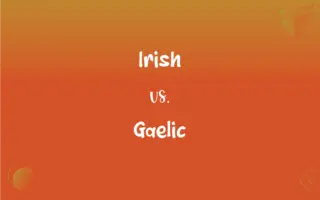Farthest Away vs. Furthest Away: What's the Difference?
Edited by Aimie Carlson || By Harlon Moss || Published on January 6, 2024
Farthest away refers to the most distant point in physical space; furthest away can also imply metaphorical or abstract distance.

Key Differences
"Farthest away" is typically used in physical contexts to denote the most extreme distance in space or range. "Furthest away," while often interchangeable, can also extend to metaphorical or abstract distances, such as in discussions of time, ideas, or emotions.
The usage of "farthest away" is more common in geographical or measurable scenarios, where precise distances are discussed. In contrast, "furthest away" is frequently employed in literary or figurative speech, emphasizing the extent of difference or separation in non-physical terms.
"Farthest away" often appears in scientific, navigational, or spatial contexts, implying a quantifiable distance. "Furthest away" can be found in philosophical or theoretical discussions, where the distance is more conceptual than actual.
In the realm of astronomy or exploration, "farthest away" is preferred to describe the physical distances between celestial bodies or locations. Meanwhile, "furthest away" might be used to describe the extent of one's knowledge or understanding, indicating a more abstract form of distance.
When giving directions or describing travel, "farthest away" is apt for conveying the longest physical distance. However, "furthest away" could be used in a narrative or poetic sense, such as describing someone's emotional distance or detachment.
ADVERTISEMENT
Comparison Chart
Primary Use
Physical distance
Physical and metaphorical distance
Contexts
Geographical, spatial
Literary, figurative, abstract
Connotation
Measurable, precise
Conceptual, relative
Examples
Astronomical distances, travel
Emotional distance, theoretical concepts
Preferred in
Scientific, navigational discussions
Philosophical, literary discussions
ADVERTISEMENT
Farthest Away and Furthest Away Definitions
Farthest Away
The maximum spatial separation attainable.
The farthest away galaxy observed is billions of light-years away.
Furthest Away
The point of greatest separation, in reality or conceptually.
She felt furthest away from home when she was misunderstood.
Farthest Away
The extreme limit of a physical area.
We traveled to the farthest away village in the region.
Furthest Away
The ultimate degree of distance or difference.
The furthest away he got from his roots, the more he valued them.
Farthest Away
At the most extreme physical distance.
The mountain peak was the farthest away point we could see.
Furthest Away
The maximum extent in abstract or physical terms.
They explored ideas that were furthest away from the mainstream.
Farthest Away
The longest measurable distance from a specific point.
The island was farthest away from the mainland.
Furthest Away
The most remote point, in both tangible and intangible terms.
His dream seemed furthest away when he faced challenges.
Farthest Away
The most distant point in a given physical range.
He sat at the farthest away seat in the auditorium.
Furthest Away
At the greatest distance, either physical or metaphorical.
Her thoughts drifted to the furthest away corners of her imagination.
FAQs
Can "furthest away" be used metaphorically?
Yes, "furthest away" is often used in both physical and metaphorical contexts.
In navigation, which term is more appropriate?
"Farthest away" is more appropriate in navigation for precise physical distances.
Does "furthest away" have a literary use?
Yes, "furthest away" is commonly used in literary or figurative language.
Can "furthest away" imply emotional distance?
Yes, "furthest away" can describe emotional or conceptual distances.
How do astronomers use these terms?
Astronomers prefer "farthest away" for discussing distances in space.
Do scientific papers use "furthest away"?
Scientific papers typically use "farthest away" for clarity and precision.
Are the terms interchangeable in everyday speech?
In casual conversation, they can be interchangeable, though nuances exist.
Is "farthest away" only for physical distances?
Yes, "farthest away" is primarily used for measurable, physical distances.
Is "farthest away" used in sports?
Yes, in sports, "farthest away" might refer to the longest physical distances achieved.
Are these terms used differently in British and American English?
Usage is generally similar, though individual preferences may vary.
In travel writing, which term is more common?
"Farthest away" is often used in travel writing to describe physical distances.
In geography, which term is preferred?
"Farthest away" is usually preferred in geography for measurable distances.
Is "farthest away" common in casual dialogues?
It's less common in casual dialogues, where precise distances aren't emphasized.
Does "furthest away" suit abstract discussions?
Absolutely, "furthest away" is ideal for abstract or theoretical discussions.
Can "farthest away" relate to time?
Rarely, as "farthest away" is more suited to spatial than temporal distances.
Can "furthest away" imply a degree of difficulty?
Yes, it can imply a metaphorical distance in terms of difficulty or achievement.
Is "farthest away" suitable for describing emotional detachment?
Not typically; "furthest away" is better for describing emotional states.
Does "furthest away" imply a sense of finality?
It can, especially in contexts discussing the ultimate extent or limit of something.
Does "furthest away" work in poetry?
Yes, "furthest away" is effective in poetry for its metaphorical potential.
Can "furthest away" refer to future possibilities?
Yes, it can be used to describe distant, future scenarios or ambitions.
About Author
Written by
Harlon MossHarlon is a seasoned quality moderator and accomplished content writer for Difference Wiki. An alumnus of the prestigious University of California, he earned his degree in Computer Science. Leveraging his academic background, Harlon brings a meticulous and informed perspective to his work, ensuring content accuracy and excellence.
Edited by
Aimie CarlsonAimie Carlson, holding a master's degree in English literature, is a fervent English language enthusiast. She lends her writing talents to Difference Wiki, a prominent website that specializes in comparisons, offering readers insightful analyses that both captivate and inform.







































































